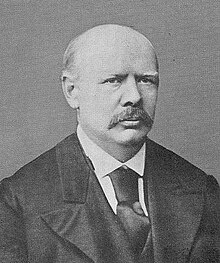Rudolf Westphal (3 July 1826 – 10 July 1892) was a German classical scholar.
Rudolf Westphal | |
|---|---|
 Rudolf Westphal | |
| Born | 3 July 1826 Obernkirchen, Germany |
| Died | 10 July 1892 (aged 66) |
| Nationality | German |
| Occupation | musical scholar |
Life
editWestphal was born at Obernkirchen in Schaumburg. He studied at Marburg and Tübingen, and was professor at Breslau (1858–1862) and Moscow (1875–1879). He subsequently lived at Bückeburg, and died at Stadthagen in Schaumburg-Lippe on 10 July 1892.[1] Westphal devoted his life in translating and interpreting the works of Aristoxenus. He then applied Greek theories of poetic meter to eighteenth- and nineteenth century music.[2]
Westphal was a man of varied attainments, but his chief claim to remembrance rests upon his contributions on Greek music and metre. His chief works were:
- Griechische Metrik (3rd ed., 1885–1889)
- System der antiken Rhythmik (1865)
- Hephaestion's De metris enchiridion (1866)
- Aristoxenus of Tarentum (translation and commentary, 1883–1893, vol. ii. being edited after his death by F Saran)
- Die Musik des griechischen Altertums (1883)
- Allgemeine Metrik der indogermanischen and semitischen Volker (1892)
He made translations of Catullus (1870) and of Aristophanes' Acharnians (1889), in which he successfully reproduced the Dorisms in Low German.[1]
References
edit- ^ a b One or more of the preceding sentences incorporates text from a publication now in the public domain: "Westphal, Rudolf". Encyclopædia Britannica. Vol. 28 (11th ed.). 1911. p. 556.
- ^ Greer, Taylor Aitken (December 22, 1998). A Question of Balance: Charles Seeger's Philosophy of Music. Berkeley: University of California Press. p. 167. ISBN 978-0-520-21152-0. Retrieved 12 February 2022.